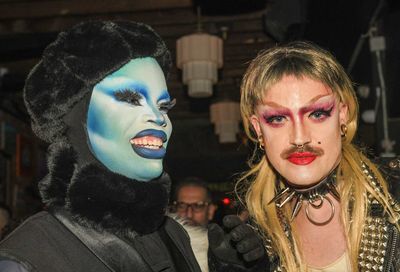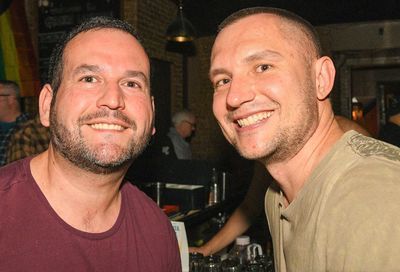Can a pro-gay “urban Republican” gain traction in Washington, D.C.?
Michael Bekesha hopes Ward 6 voters can see past Trump and support a "socially progressive, fiscally responsible" Republican

“It is tough to be a Republican this year. It’s particularly tough this year, out of all years,” says Ward 6 Council candidate Michael Bekesha, referring to the District of Columbia’s heavy Democratic tilt and the unpopularity of President Trump among a majority of District residents.
“But I also think that’s one of the reasons I’m not afraid to run this year, because I don’t associate myself with the national Republican Party,” he adds.
If there’s any place in America where President Trump’s use of incendiary rhetoric and appeals to nationalism don’t wear well, it’s D.C. And Bekesha is mindful of that, choosing to model himself after Massachusetts Gov. Charlie Baker (R) instead of embracing the president.
At first blush, some of Bekesha’s stances seem downright liberal. He supports LGBTQ rights and access to abortion. He speaks out against police brutality. He supports the #MeToo movement and believes it is long overdue. He believes that climate change is real, and that D.C. can institute policies to mitigate its ecological footprint. Even his wife is a Democrat.
“I am a Republican from Massachusetts,” he notes. “Somebody who’s socially progressive, fiscally responsible, who cares about community, cares about making sure that our streets are safe, our businesses are doing well, that our people are getting educated. That’s what it means, at least for me, to be an ‘urban Republican.’”
But Bekesha isn’t just running as Democrat-lite: instead, he’s choosing to emphasize issues that affect Ward 6 residents’ daily lives, including street cleanup, garbage pickup, reducing crime, cutting through bureaucratic red tape and excessive regulations, and ensuring that District residents’ tax money is being spent wisely. He also emphasizes the importance of having a diversity of voices at the table when it comes to making policy, and providing a check on those in positions of power.
“I believe we need an opposition party, a strong second party in the District,” he says, referring to the current Council, which is comprised of 11 Democrats and two nominal independents who embrace left-leaning policies.
For all of the outsized attention that District residents pay to President Trump — whose daily antics often eclipse the machinations of D.C. government officials — Bekesha says the president rarely comes up in discussions with prospective voters.
“The president comes up when I talk to journalists,” he says. “They want to know what I think about him and what he’s doing. But when I’m knocking on doors, talking to 20 people a day at their homes, it’s really hard for someone to say, ‘You’re a Republican, you’re racist’ to your face.
“For the most part, people are more interested in how I’m going to solve the serious problems that D.C. currently has, with the rise in homicides, what appears to be an increase in violent crime, the fact that our schools are not preparing our students for college or career, as some of the bigger issues,” Bekesha says. “And then, smaller issues like used condoms all over the streets, if you’re up in the H Street Corridor, or parking if you’re Hill East, or potholes and traffic in Barracks Row, or, near the Wharf, rats. People don’t want to talk about the national Republican brand.”
John Fluharty, the executive director of the D.C. GOP, notes that Bekesha is not alone in his attempts to distance himself from the national party. However, he says, that doesn’t mean that conservative voters should punish him for not being a Trump loyalist.
“Republicans have to decide that they’re done losing in the District,” says Fluharty. “If folks want to win, we’ve got to rally behind Michael.
“I think there’s also this failure to understand that there’s this new breed of Republicans — that is ‘urban Republicans,’ who are socially moderate to progressive, fiscally responsible, and all about accountability,” adds Fluharty. “We need to understand that a Republican in D.C. or Center City Philadelphia or Manhattan is not going to be the same as a Republican in Western Maryland or Southern Virginia. And we need to start figuring out how to get that message across.”
Fluharty, the openly gay former head of the Delaware GOP, says Republicans are potentially poised to gain back ground among LGBTQ voters — of which there are many in Ward 6 — by stressing the issues that are important to voters, and not getting bogged down by the President’s latest tweets.
“We have to drive home the message that if you judge the local party by the behavior of Donald Trump, you have taken the bait. You are no longer looking at the issue of homicides, or the opioid crisis, or other issues,” he says. “If we’re dealing with a post-marriage equality environment, we have to look at issues that impact all families, no matter what their composition is: growing the economy, new jobs, improving public education — those are our issues.
“There also has to be a willingness to go into the community and talk about solutions that people understand,” Fluharty adds. “You can’t just walk in and say, ‘Here we are. Now vote for us because we’re better than the Democrats.’”
Adam Savit, the president of the D.C. chapter of Log Cabin Republicans, says Bekesha’s campaign was the first time he had personally heard of an “urban Republican.”
Noting that he is not speaking in an official capacity, Savit says that non-stop news coverage surrounding President Trump’s actions may hurt Republicans in heavily Democratic areas, just because some voters will associate Republican candidates with the president by dint of their shared political affiliation. But others may be drawn to Trump because of the policies he’s pushing, particularly with respect to the economy.
“People might be surprised by the amount of people who are Trump supporters. Over time, that’s growing,” adds Savit. “They have reservations about his character and rhetoric. But slowly they’re seeing over time that, regardless of the noise on the outside, they’re seeing they agree with some of these policies.”
That said, Savit acknowledges that so-called “urban Republicans” in the District, a super-majority of whom voted for Ohio Gov. John Kasich or Florida Sen. Marco Rubio in the 2016 primary, are probably less favorably inclined toward Trump.
“Even if Ward 6 was majority Republican, which it isn’t, you wouldn’t have a majority of Trump supporters, so I understand how and why Michael Bekesha is trying to distinguish himself from the national party,” says Savit.
Since early October, Bekesha has taken off time from work to campaign full time, standing outside Metro stops in the mornings, knocking on doors, handing out flyers, shaking hands and having conversations at farmers markets and local festivals, and attending various candidate forums, as he tries to grow his name recognition and let voters know that they have an alternative to Councilmember Charles Allen (D).
He’s even had a campaign volunteer dress up in a chicken costume, holding up a sign in an attempt to goad the incumbent into agreeing to additional debates.
“I was in the debates prior to the primary, between myself, Charles, and his primary challenger, Lisa Hunter,” Bekesha recalls. “Because it was before the Democratic primary, out of the 250 people that attended each, 225 of them were Democrats. A lot of people on that day, as well as when I would see them after, told me: ‘I never thought I’d agree with a Republican, but I found myself nodding or agreeing with a lot with what you were saying.’”
As for how he’d foster relationships with his fellow Councilmembers on the decidedly partisan Council, Bekesha says he believes he can find common ground.
“Vince Gray talks about how only 15% of our police force lives in the District. I talk about that, too. We could work together in improving our police force,” he explains. “When you talk about oversight and fiscal responsibility, although I don’t agree with Elissa Silverman on a lot of her bigger policy ideas, if she’s re-elected, going through the budget line by line is something that I could work with her on.
“Anita Bonds, at the At-Large Council debate, talked about nightlife and making sure that if we’re going to be a 24/7 city, that workers in those industries have opportunities to find affordable housing and ways to get home at night, because the Metro’s closed. So I would work with her on that,” he adds. “So making relationships work with somebody that’s a different party isn’t necessarily a problem.”
Bekesha is aware that some voters will remain skeptical of his party affiliation, no matter what he says on the campaign trail.
“You’re never going to convince some people. I talk a lot about the fact that my wife’s a Democrat, and we disagree about what the role of the federal government is, the size of the federal government. We don’t disagree on social issues. If we did, we wouldn’t be married, as she will tell anyone,” he says with a chuckle.
“If somebody’s not going to believe me, they’re not going to believe me,” he adds, “but I can’t do anything besides show up, talk, express my opinions, and engage with voters.”
Support Metro Weekly’s Journalism
These are challenging times for news organizations. And yet it’s crucial we stay active and provide vital resources and information to both our local readers and the world. So won’t you please take a moment and consider supporting Metro Weekly with a membership? For as little as $5 a month, you can help ensure Metro Weekly magazine and MetroWeekly.com remain free, viable resources as we provide the best, most diverse, culturally-resonant LGBTQ coverage in both the D.C. region and around the world. Memberships come with exclusive perks and discounts, your own personal digital delivery of each week’s magazine (and an archive), access to our Member's Lounge when it launches this fall, and exclusive members-only items like Metro Weekly Membership Mugs and Tote Bags! Check out all our membership levels here and please join us today!























You must be logged in to post a comment.